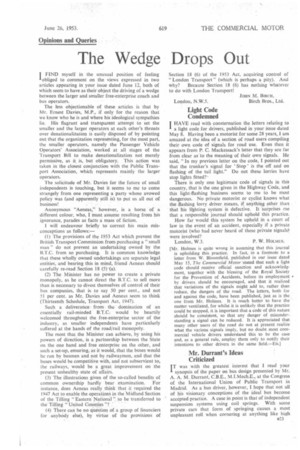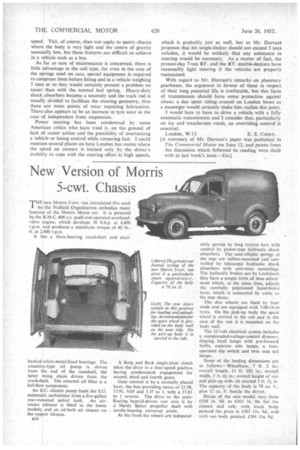Opinions and Queries
Page 57

Page 58

If you've noticed an error in this article please click here to report it so we can fix it.
The Wedge Drops Out
I FIND myself in the unusual position of feeling I obliged to comment on the views expressed in two articles appearing in your issue dated June 12, both of which seem to have as their object the driving of a wedge between the larger and smaller free-enterprise coach and bus operators.
The less objectionable of these articles is that by Mr. Ernest Davies, M.P., if only for the reason that we know who he is and where his ideological sympathies lie. His flagrant and transparent attempt to set the smaller and the larger operators at each other's throats over denationalization is easily disposed of by pointing out that the organization representing, for the most part, the smaller operators, namely the Passenger Vehicle Operators' Association, worked at all stages of the Transport Bill to make denationalization not merely permissive, as it is, but obligatory. This action was taken in the closest conjunction with the Public Transport Association, which represents mainly the larger operators.
The solicitude of Mr. Davies for the future of small independents is touching, but it seems to me to come strangely from one representing a party whose avowed policy was (and apparently still is) to put us all out of business!
Anonymous "Aeneas," however, is a horse of a different colour, who, I must assume resulting from his ignorance, parades as facts a mass of fiction.
I will endeavour briefly to correct his main misconceptions as follows:—
(I) The provisions of the 1953 Act which prevent the British Transport Commission from purchasing a " small man" do not prevent an undertaking owned by the B.T.C. from so purchasing. It is common knowledge that these wholly owned undertakings are separate legal entities, and bearing this in mind, friend Aeneas should 'carefully re-read Section 18 (5)'(a).
(2) The Minister has no power to create a private monopoly, as he cannot direct the B.T.C. to sell more than is necessary to divest themselves of control of their bus companies, that is to say 50 per cent., and not 51 per cent. as Mr. Davies and Aeneas seem to think (Thirteenth Schedule, Transport Act, 1947).
Such a deliverance from the domination of an essentially rail-minded B.T.C: would be heartily welcomed throughout the free-enterprise sector of the industry, as smaller independents have particularly suffered at the hands of the road/rail monopoly.
The most that the Minister can achieve, by using his powers of direction, is a partnership between the State on the one hand and free enterprise on the other, and such a set-up, ensuring, as it would, that the buses would be run by busmen and not by.railwaymen, and that the buses would be competitive with, and not subservient to, the railways, would be a great improvement on the present unhealthy state of affairs.
(3) The illustrations given of the so-called benefits of common ownership hardly bear examination. For instance, does Aeneas really think that it required the 1947 Act to enable the operations in the Midland Section of the Tilling "Eastern National ", to be transferred to the Tilling "United Counties "?
(4) There can be no question of a group of financiers (or anybody else), by virtue of the provisions of Section 18 (6) of the 1953 Act, acquiring control of "London Transport" (which is perhaps a pity). And why? Because Section 18 (6) has nothing whatever to do with London Transport!
Jon t M. BIRCH,
London, N.W.5. Birch Bros., Ltd.
Light Code Condemned
HAVE read with consternation the letters relating to I a light code for drivers, published in your issue dated May 8. Having been a motorist for some 28 years, I am amazed at the idea of a section of road users compiling their, own code of signals for road use. Even then it appears from P. C. Mackessack's letter that they are fat from clear as to the meaning of their own signals. He said, "In my previous letter on the code, I pointed out that the trunker's signal for Stop' is the off and on flashing of the tail light." Do not these lorries have stop lights fitted?'
There is only one legitimate code of signals in this country, that is the one given in the Highway Code, and this light-flashing business seems to me to be most dangerous. No private motorist or cyclist knows what the flashing lorry, driver, means, if anything other than that his lighting system is defective. It 'surprises me that a responsible journal should uphold this practice.
How far would this system be upheld in a court of law in the event of an accident, especially if a private motorist (who had never heard of these private signals) were involved?
London, W.3. P. W. HOLMES.
[Mr. Holmes is quite wrong in assuming that this journal is upholding this practice. In fact, in a footnote to a letter from W. Bloomfield, published in our issue dated May 15, The Commercial Motor stated that such a lighl code should receive official sanction and acknowledgment, together with the blessing of the Royal Society for the Prevention of Accidents, before its employment by drivers should be encouraged, and that it realized that variations of the signals might add to, rather than reduce, the dangers of the road. The letters, both for and against the code, have been published, just as is the one from Mr. Holmes. It is much better to have the matter ventilated, for whilst it is unlikely that the practice could be stopped, it is important that a code of this nature shduld be consistent, so that any danger of misunderstanding a signal can be reduced. It is appreciated that many other users of the road do not at present realize what the various signals imply, but no doubt most commercial vehicle drivers understand this to be the case and, as a general rule, employ them only to notify their intentions to other drivers in the same field.—Eo.]
Mr. Durrant's Ideas Criticized
IT was with the greatest interest that I read your 1 synopsis of the paper on bus design presented by Mr. A. A. M. Durrant, C.B.E., M.I.Mech.E., at the Congress of the International Union of Public Transport in Madrid. As a bus driver, however, I hope that not all of his visionary conceptions of the ideal bus become accepted practice. A case in point is that of independent suspension systems using coil springs. With some private cars that form of springing causes a most unpleasant roll when cornering at anything like high
speed. This, of course, does not apply to sports chassis where the body is very light and the centre of gravity unusually low, but these features are difficult to achieve in a vehicle such as a bus.
As far as ease of maintenance is concerned, there is little advantage in the coil type, for even in the case of the springs used on cars, special equipment is required to compress them before fitting and in a vehicle weighing 5 tons or so they would certainly present a problem no easier than with the normal leaf spring. Heavy-duty shock absorbers become a necessity and the track rod is usually divided to facilitate the steering geometry, thus there are more points of wear requiring lubrication. There also appears to be an increase in tyre wear in the case of independent front suspension.
Power steering has been condemned by some American critics who have tried it, on the ground of lack of castor action and the possibility of overturning a vehicle or losing control while cornering fast. I could merit in several places on busy London bus routes where the speed on corners is limited only by the driver's inability to cope with the steering effort at high speeds,
which is probably just as well, but as Mr. Durrant proposes that his single-decker should not exceed 5 tons unladen, it would be unlikely that any assistance in steering would be necessary. As a matter of fact, the present-day 7-ton RF. and the RT. double-deckers have reasonably light steering if the vehicles are properly maintained.
With regard to Mr. Durrant's remarks on planetary gearboxes, the argument in favour of these in respect of their long potential life is irrefutable, but this form of transmission should have some protection against abuse; a day spent riding around on London buses as a passenger would certainly make him realize this point.
I would hate to have to drive a vehicle with a fully automatic transmission and 1 consider that, particularly on icy and treacherous roads, an overriding control is essential.
London, W.13. E. S. COOKE.
[A summary of Mr. Durrant's paper was published in The Commercial Motor on June 12, and points from the discussion which followed its reading were dealt with in last week's issue.—Eo.]




































































































